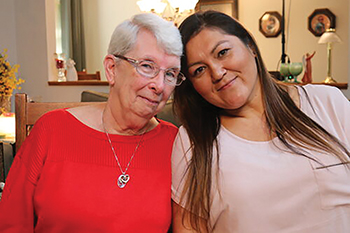Chronic Lymphocytic Leukemia Survivor
Learning to live with CLL takes knowledge and support

Diagnosed at 69, Marialice Goddard is successfully managing her chronic lymphocytic leukemia (CLL) with the help of a strong support system, a trusted medical team and a clinical trial. Taking a cue from the support group she attends monthly, she shares her story to encourage others with CLL.
Five years after being diagnosed with CLL, I began treatment. My doctor and I had been “watching and waiting” until my symptoms really progressed. Believe it or not, those five years were the most difficult part of my CLL diagnosis.
I’d never heard of this type of leukemia, but I assumed I’d take medicine and get rid of it. That was not my treatment plan. I was blessed that the local oncologist I was referred to was a CLL specialist, and I trusted him completely — but I didn’t like this plan and I told him. He said he heard that all the time, and he assured me there was no need to treat before it was necessary.
I was very anxious for about a year. I was sure that every twitch, every pain in my toe, was the CLL. Then my husband was diagnosed with Stage IV colon cancer, and I turned my focus to caring for him. Though we both had cancer, we took care of each other, and it was a nice distraction.
A few years later, fatigue set in. I retired from my role in high school Special Education because it was hard to keep up. When I became so fatigued that I couldn’t get off the couch to get to the bathroom, my daughter Mary took me to the doctor because by that time, my husband had passed away.
My doctor determined it was time to begin treatment. He recommended a research study that consisted of infusion therapy followed by oral therapy. I didn’t have any experience with clinical trials, but I felt so awful and I trusted him, so I followed his advice.
I was 74 when I began the clinical trial. Getting used to treatment wasn’t difficult. I only had minor issues that went away after a few months, and the fatigue resolved fairly quickly. I’ve had consistent, quality care from my doctor and the medical research team. They are excellent communicators, and I get my questions answered right away — even though I tend to have a lot of them!
The representative from the research study has been very involved. At the start, she explained medication adherence and how to track the oral medication on a chart she provided. To stay on schedule, I set the timer on my cell phone and on the stove every night as a reminder to take the pills. When I go for regularly scheduled monitoring, I turn in my medication tracking chart and get a new, clean one. I also trade in my empty pill bottles for full ones. She contacts me frequently to check on me, and she has become a good friend.
My family has always been a strong source of support. My daughter is my rock, and my sister and her husband are her backups. However, after I began treatment, the research representative talked with me about the benefits of being in a support group. She encouraged me to look into The Leukemia & Lymphoma Society.
I joined a group that meets online monthly. People with all types of leukemia and lymphoma talk about how they deal with having a blood cancer. It doesn’t make having cancer less scary, but it is easier once you realize other people understand. I’ve learned a lot, and it’s really nice to hear the progress that other people are making.
I don’t get down too often anymore – my daughter has a real knack for bringing me up. I do have times when I feel lonely. Before I began treatment, sometimes my fatigue was so intense that it was almost disabling. But because CLL is a blood disease, I didn’t look sick. I got more sympathy after a fall in the driveway left me with a cast on my arm! It’s not that I want sympathy, but the lack of it can sure make you feel as if no one understands what you are going through. That is why I think the ultimate thing to have after a CLL diagnosis is support.
Since I began the research study, the medication being tested has been approved by the U.S. Food and Drug Administration. I’m still on the same regimen, and the only question is really how long I should continue. I know that everyone reacts to treatments differently, but so far, it’s been excellent for me. Regular labwork and CT results will tell me if it stops being effective, and I also get annual preventive checks to make sure I’m healthy otherwise. If it comes time to make a change, I’m sure my doctor will have another suggestion for me.
I am so grateful that the therapy in the clinical trial helps me live a normal life, but I still have hope there will be a cure someday.
My advice to you:
- Be well-informed. It can reduce your stress.
- Ask questions. If the question is important to you, that’s all that matters.
- Have a support system that is always there for you. If you can’t find a group, start one.


